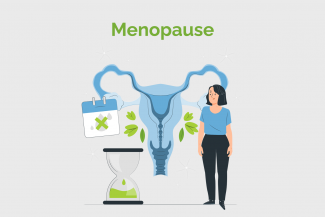
Menopause symptoms can often be managed with natural options.
Hot Flashes:
- Acupuncture, which stimulates specific points on the skin with thin needles, heat pressure or laser.
- Eating soya, which is rich in proteins and isoflavones, a plant oestrogen (phytoestrogen)
- Exercise
- Wear cool cotton clothing
- Avoid spicy food and caffeine
Non-prescription treatment like Vitamin B & E and Ibuprofen to get relief from the pain caused by hot flashes
Trouble sleeping: Difficulty sleeping at night and with night time sweats.
- meditation
- yoga or tai-chi or any other gentle exercise
- calming music while sleeping
- cool pillows
Vaginal dryness:
- Use water based lubricant gels that lubricate and moisturise the vagina
- Avoid smoking that further reduces the release of oestrogen hormones
- Drink more water to prevent dehydration of the vagina as well as the body
- Eat apple, nuts, soya and whole grains as they help relieve vaginal dryness.
Urinary tract infections:
- Drink plenty of water, urinate frequently and consult your doctor for medication.
Osteoporosis:
- Eat a balanced diet
- Have more vitamin D and calcium. According to dietary reference intake (DRI), women at menopause are recommended 1200mg of calcium daily. Vitamin D recommendation is 400-500 IU per day for those over 50 and 600 IU for those 60-70 years
- Exercise. Include light weights in your exercise routine (after consulting your doctor and a fitness trainer)
- Avoid smoking and alcohol intake
Increased risk of heart disease:
The American Heart Association recommends the following for better heart health:
- Eat 4.5 cups per day of fruits and vegetables
- 6-8 servings per day of fibre-rich whole grains based on a 2000 calorie diet
- Variety of nutritious foods each week such as fatty fish, unsalted nuts and legumes
- 150 minutes of physical activity each week, like walking, cycling, dancing or swimming
Mood swings, Depression, Fatigue, Irritability:
- Practise meditation, yoga
-
Break up bigger jobs into smaller ones
-
Participate in recreational activities you enjoy
Memory loss:
- Try games like Sudoku, crossword puzzles etc.
Anxiety:
- Feeling anxious, nervous or worried constantly due to variations in the hormone level. How to manage this:
- Know what is causing stress and try to minimise them.
- Relax by going to the park, playing with kids, listening to music. If anxiety is severe, consult your doctor.
Fat accumulation around the waist:
- Eat low-fat, high-fibre diet.
- Exercise every day.
Hair loss:
- Use a gentle shampoo
- Scalp massage
- Eat protein and iron-rich foods like red meat
- Eat fruits rich in vitamin C, like citrus fruits
- Minimise stress and improve sleep
Diet recommendations for Menopause management
A healthy diet will help ease some of the risks that accompany menopause. Include the following in your diet:
• Fishes like salmon, sardine or tune, rich in omega 3 fatty acids, should be eaten twice a week. This benefits the heart.
• More calcium i.e.,1200 mg of calcium per day
• More Vitamin D - 400-500 IU per day for those over 50 and 600 IU for those over 60-70 years
• Have plant-based foods with isoflavones (plant oestrogen), eg soy and tofu
• Reduce salt intake to control hypertension
• Eat high-fibre foods like pasta, whole grain bread, fruits, cereals etc
• Up your intake of protein as women often have low iron
• Cut back on high-fat foods as weight gain is a problem post menopause
• Drink plenty of water and reduce alcohol intake
Exercise recommendations for managing menopause symptoms
Exercising regularly strengthens bones, is good for the heart and keeps weight gain under control – all problems that are heightened after menopause.
• Regular exercise like walking, jogging or swimming
• Strength training in the gym
• Take up an activity that you enjoy, like salsa dancing, tennis or badminton
• Regular housework can also be good
• Yoga and meditation
Take charge- Your action plan
- Eat healthy
- Keep your blood cholesterol, pressure and blood sugar in check
- Get a bone density check
- Exercise – yoga, swimming, walking etc
How to stay healthy after menopause
Support team
• General physician
• Gynaecologist
• Nutritionist
• Fitness expert










